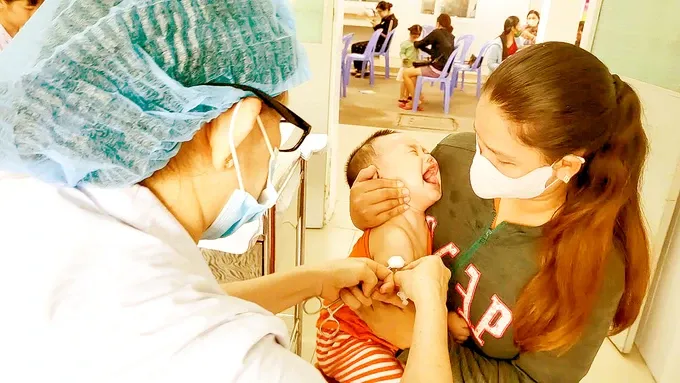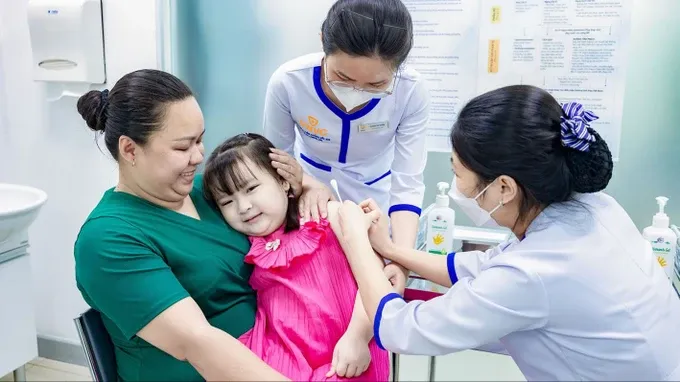
According to her booking, Nguyen Thuy An from Binh Tri Dong B Ward of Binh Tan District in HCMC took her child to the ward health clinic for a Japanese encephalitis vaccine, which is provided free of charge under the Expanded Program on Immunization (EPI). However, the health staff informed her that this vaccine was out of stock. To ensure her child's immunization schedule and health, Thuy An took her child to a private healthcare facility and paid for the needed vaccine.
Not only are vaccines in the EPI program scarce, but many supplementary ones to prevent other diseases outside the EPI list and those for adults are also "out of stock" at public vaccination points. On October 7, the Institute Pasteur in HCMC announced that many vaccines, such as the 4-in-1 vaccine (diphtheria, tetanus, pertussis, polio - Tetraxim vaccine), influenza vaccine (Vaxigrip-tetra), typhoid vaccine (Typhim VI), and meningococcal meningitis vaccine (Menactra), were out of stock. Vaccination points of the HCMC Center for Disease Control also face a shortage of some vaccines.
In contrast, private vaccination centers always affirm that they can meet the immunization needs of the population with a full range of vaccines.
VNVC, a major player in the vaccination industry, always commits to no vaccine shortages and states that the unit has advantages with strategic partners such as Glaxosmithkline (Belgium), Sanofi Pasteur (France), Pfizer (the US), Merck Sharp and Dohme (the US). Therefore, it can negotiate directly and independently to import a large quantity of genuine vaccines, especially those that are often scarce.
Long Chau Vaccination Center also affirms that it always has enough types of vaccines to prevent various diseases and a variety of vaccines from different countries for people to choose from.
According to a preventive medicine expert, previously, the vaccination market in Vietnam was mainly concentrated in public hospitals and health centers. However, the monopoly, along with the vaccine procurement and bidding mechanism with many administrative procedures, led to occasional vaccine shortages and disrupted children's immunization schedules.
Nevertheless, the claim that private vaccination centers are “dominating the vaccine market” and that public healthcare facilities are “pushing people to service vaccination facilities by announcing that EPI vaccines are out of stock” has not been verified.
There are now situations of constant shortages of vaccine at many public vaccination centers, coupled with numerous cases of anaphylaxis and even death after receiving free vaccines, which has led many parents to take their children for paid vaccinations as they think paid vaccines are of better quality than free vaccines.
In response to this, Assoc Prof Dr Tran Dac Phu (former Director of the Department of Preventive Medicine, Ministry of Health) stressed that it cannot be said that paid vaccines are better than free ones in the EPI program. Because vaccines in either the EPI program or paid vaccines must be licensed by the Ministry of Health before being used, their safety and efficacy are strictly tested.
Vaccines in the former program are paid for by the state and supported by international organizations to serve about 90 percent of Vietnamese children under one year old, effectively contributing to eliminating such diseases as poliomyelitis and neonatal tetanus.

Regarding the report from the provinces of Ben Tre, An Giang, and Quang Tri about a severe shortage of vaccines in the EPI program and a low immunization rate, which poses a risk of outbreaks of some dangerous diseases in children, on September 30, Minister of Health Dao Hong Lan issued a reply stating that this is the first year that localities have implemented the procurement of EPI vaccines from local budgets, so they have encountered many difficulties in arranging and approving budgets, as well as obstacles in bidding procedures and price approval.
To overcome this situation, the Ministry of Health has submitted a report to the Government and received the support of the National Assembly, directing the allocation of the central budget to continue implementing the procurement of vaccines in the EPI program.
The Ministry of Health has guided and directed provinces and cities nationwide to consolidate the demand for vaccines and complete the procurement procedures for 10 types of domestically produced vaccines. At the same time, these localities are asked to continue to direct relevant units to ensure adequate vaccine supply in the coming time, and proactively implement immunization activities, strengthen surveillance, detect epidemics, and deploy comprehensive disease prevention and control measures to prevent the spread of diseases.
Over VND424 billion (US$17 million) supplemented for the Expanded Program on Immunization
Deputy Prime Minister Ho Duc Phoc has signed a decision supplementing the regular budget estimate of the Ministry of Health for 2024 to carry out the EPI. Accordingly, the supplementary estimate for the health, population, and family sector of the Ministry of Health in 2024 is VND424.5 billion to carry out EPI activities from the regular budget estimate of the central budget in 2024.
The Ministry of Finance and the Ministry of Health are responsible for the content, reported data, and proposed figures. The management, use, and settlement of the supplemented funds must ensure compliance with regulations and policies, efficiency, publicity, transparency, and correct use without loss, negativity, or waste.
Vaccines help children live healthy lives
According to the United Nations Children's Fund (UNICEF), vaccines help children live healthy lives by protecting them from diseases. In Vietnam, immunization has saved millions of lives and protected countless children from illness and disability. The national EPI program, with the support of UNICEF, has successfully eliminated poliomyelitis, neonatal tetanus, and measles. In the past 25 years, vaccines have protected 6.7 million Vietnamese children and prevented 42,000 deaths from deadly childhood diseases such as diphtheria, pertussis, poliomyelitis, and neonatal tetanus.
Vietnam accesses many new and rare vaccines
The VNVC immunization system has recently deployed dengue fever vaccines and shingles vaccines for adults. These are rare vaccines and are being vaccinated in Vietnam for the first time. According to VNVC, in nearly 8 years, the unit has collaborated with leading global vaccine manufacturers to bring 13 new vaccines to Vietnam, giving people more opportunities to get vaccinated against many important diseases.
Competition in vaccination activities
In the context of the increasing complexity of diseases, the need for vaccination is essential, and many private vaccination centers have been established across the country to meet the needs of the people. The market currently has 3 large private chains providing vaccination services, namely VNVC, Long Chau, and Nhi Dong 315.
From the first vaccination center in July 2023, Long Chau now has 110 centers and aims to expand to 150 vaccination centers in the 2025-2026 period. VNVC has nearly 200 vaccination centers spread across the country, with modern and well-equipped facilities. Since the end of 2023, public hospitals have also continuously opened service vaccination centers, such as Hung Vuong Hospital, University Medical Center-HCMC, Thong Nhat Hospital, Children’s Hospital No.1.
























